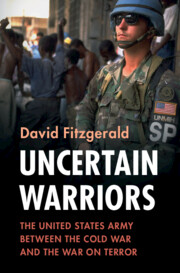Book contents
- Uncertain Warriors
- Military, War, and Society in Modern American History
- Uncertain Warriors
- Copyright page
- Dedication
- Contents
- Figures
- Acknowledgements
- Introduction
- 1 The Post-Vietnam Recovery, Operation Desert Storm and the Veneration of the Volunteer Soldier
- 2 Gender, Sexuality and the Profession of Arms
- 3 Warriors Who Don’t Fight
- 4 Downsizing, Recruiting and Debates over Military Service
- 5 Technological Transformation and the American Soldier
- 6 The Warrior Ethos
- Epilogue
- Index
3 - Warriors Who Don’t Fight
The Dilemmas of Peacekeeping Operations
Published online by Cambridge University Press: 19 October 2023
- Uncertain Warriors
- Military, War, and Society in Modern American History
- Uncertain Warriors
- Copyright page
- Dedication
- Contents
- Figures
- Acknowledgements
- Introduction
- 1 The Post-Vietnam Recovery, Operation Desert Storm and the Veneration of the Volunteer Soldier
- 2 Gender, Sexuality and the Profession of Arms
- 3 Warriors Who Don’t Fight
- 4 Downsizing, Recruiting and Debates over Military Service
- 5 Technological Transformation and the American Soldier
- 6 The Warrior Ethos
- Epilogue
- Index
Summary
This chapter examines post–Cold War debates in the United States over the US Army’s participation in peacekeeping operations. Peacekeeping missions may have been a central concern of the US Army in the 1990s, but they also exposed deeper fissures within the Army and broader American society about the organisation’s proper role and the sort of attributes that American soldiers would need in the twenty-first century. Army leaders and personnel deployed on peacekeeping operations struggled to articulate which martial values best applied to peacekeeping. Political commentators tended to be much less ambivalent about peacekeeping, with some neoconservative observers enthusiastic about using such operations to practice ‘soft’ skills that would be useful in later wars, while most conservatives displayed a deep antipathy for such interventions, arguing that they corroded valuable warfighting skills and were symptomatic of an Army that had lost its way. For the few liberal commentators engaged in debates over Army policy, peacekeeping operations represented an opportunity to showcase American values and even to promote a deeper connection between the US military and broader American society.
Keywords
- Type
- Chapter
- Information
- Uncertain WarriorsThe United States Army between the Cold War and the War on Terror, pp. 101 - 138Publisher: Cambridge University PressPrint publication year: 2023

